This was a particularly DNF-heavy month – eight books in total, four of which were originally on my Unmissable SFF of 2024 list! Not sure if that bodes well for the accuracy of my anticipated reads this year…
But one of these – The Poisons We Drink – I DNFed because of my own triggers, not anything wrong with the book itself; and another, No Gods For Drowning, wasn’t bad so much as, I lost interest in it. Important distinctions!
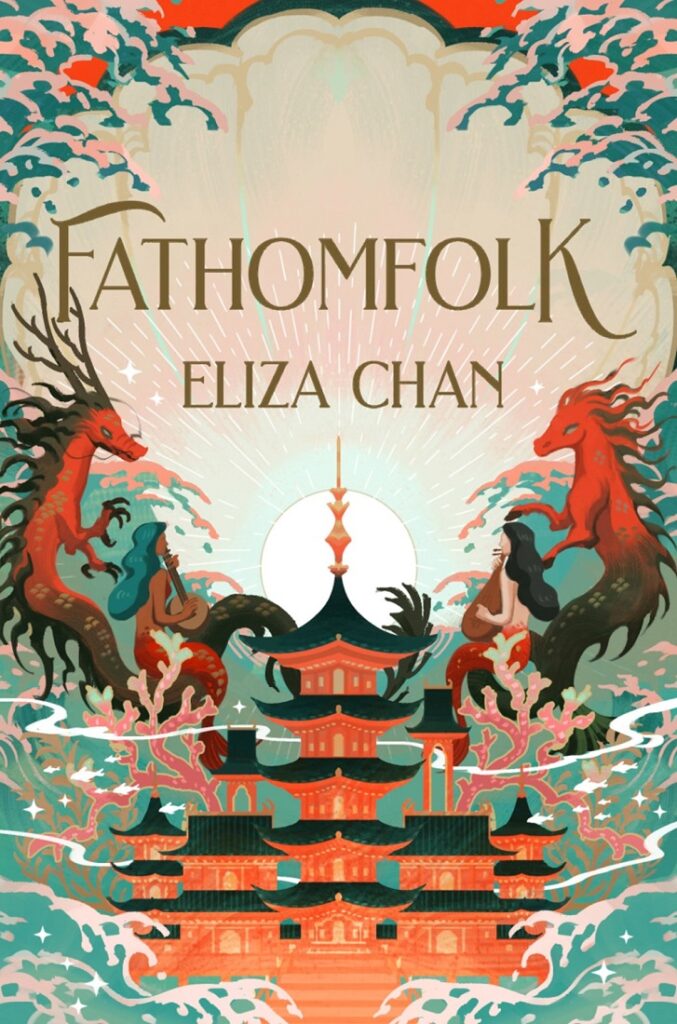
Genres: Fantasy, Queer Protagonists
Representation: East Asian-coded cast and setting, sapphic MC
Published on: 27th February 2024
ISBN: 0316564931
Goodreads

Welcome to Tiankawi – shining pearl of human civilization and a safe haven for those fleeing civil unrest. Or at least, that’s how it first appears.
But in the semi-flooded city, humans are, quite literally, on peering down from skyscrapers and aerial walkways on the fathomfolk — sirens, seawitches, kelpies and kappas—who live in the polluted waters below. And the fathomfolk are tired of it. When a water-dragon and a half siren join forces, the path to equality is filled with violence, secrets, and political intrigue. And they both must decide if the cost of change is worth it, or if Tiankawi should be left to drown.
I received this book for free from the publisher via NetGalley in exchange for an honest review. This does not affect my opinion of the book or the content of my review.
Fathomfolk has a lot of promise, but I think it could have been much, much better than it ended up being. The prose is simplistic and the phrasing is often a little awkward, particularly when it comes to dialogue, and I’m far from the first early reader to point out that most of the characters are extremely one-dimensional. I had a lot of sympathy for Mira, the half-siren recently promoted to captain of the border guard, but I also found her lack of political skills frustrating; surely she had to know that if she wanted to change things, she was going to have to play ball with the city’s elite? And it’s one thing to be no good at politicking; it’s another to be unable to control your temper and be polite when you’re dealing with people much more powerful than you. I liked her as a person, but as a character, not so much.
The others aren’t better. Nami, the water dragon, is incredibly immature – how old is she supposed to be? Because she reads as 15 or 16, all hormones and acting on impulse and never thinking things through, to the point of stupidity. Cordelia, our sea witch, was almost interesting, but I disliked how we were told her goals and motives as she manipulated people, rather than getting to watch her play puppet-master and gradually see her plans come to fruition.
At first glance, I thought the worldbuilding was wonderful, but the more we saw of it, the less sense it made to me, and I think the way Chan went about giving us the information was clumsily done. My biggest issue is, why does underwater life mimic land life so much? The Folk use their magic, called waterweaving, to protect their food in little air-pockets so it’s not ruined by the water; they use it to hold things to counters so they don’t float away; they use it to allow themselves to walk along the sea-floor. But…why would underwater life look like that? Shouldn’t it be completely different to how humans live on land? It feels incredibly lazy, like the author went looking for a way to justify/allow her underwater people to live like humans, rather than sitting down and actually thinking about how non-humans who’ve never seen dry land would live. Seriously: why are they walking on the ground? They can all swim!
Other worldbuilding questions: why are the city guard called the kumiho? Kumiho are like kitsune – fox spirits – but from Korea; do they exist in Chan’s world, or are they just stories? Why does a city that reviles the Folk have a place named Glashtyn Square (glashtyn being a kind of horse water-beastie from Manx folklore)? If dragon pearls are functionally dragon eggs, why on earth would the dragons allow humans to keep a stolen one and turn it into a symbol of land and water people getting along?! That’s a baby! How is that not obscene? But Nami’s whole storyline kicks off when she tries to steal it back and gets in an enormous amount of trouble for it – not in trouble with the humans, but the Folk, including her mother, whose pearl/egg/child it is! Wtf?
Also, I get that ‘drawback’ is a term related to tsunamis…but if you call your extremist group the Drawbacks, I promise you, that’s not what most readers are going to hear. It only makes your rebels sound like complete and utter idiots.
I loved how many different water beings from different mythologies I saw – mostly Asian, but not all – but I have no idea how to picture any of them in Chan’s world; they’re not described visually, and there’s no explanation of what a selkie, kappa, or kelpie is. If you don’t know, Chan’s not going to tell you; and even if you know the mythology – which in most cases I did – there’s no guarantee that what I’m picturing is what Chan wants me to picture. That was baffling and annoying in equal measure.
There’s a fair amount of telling-not-showing – which was so disappointing with such a gorgeous and diverse setting, where I wanted to see everything! – but the dealbreaker for me was how often important moments kept happening off-page, for us to be told about them later. For example, early in the book, Mira has a pretty major fight with her boyfriend – but we have no idea until she recaps it for us in her thoughts in a later chapter. That was a scene that should have been on the page, and I have no idea why it wasn’t.
To me, Fathomfolk feels unfinished, an early draft with the potential to be something incredible, but that just isn’t there yet. The characters need more fleshing out; the underwater worldbuilding needs to be completely rethought from the seafloor up; and the prose needs at least one more round of polishing to make it flow – pun fully intended – better. As it is, I had no interest in finishing it, and I doubt I’ll be coming back for another try later.
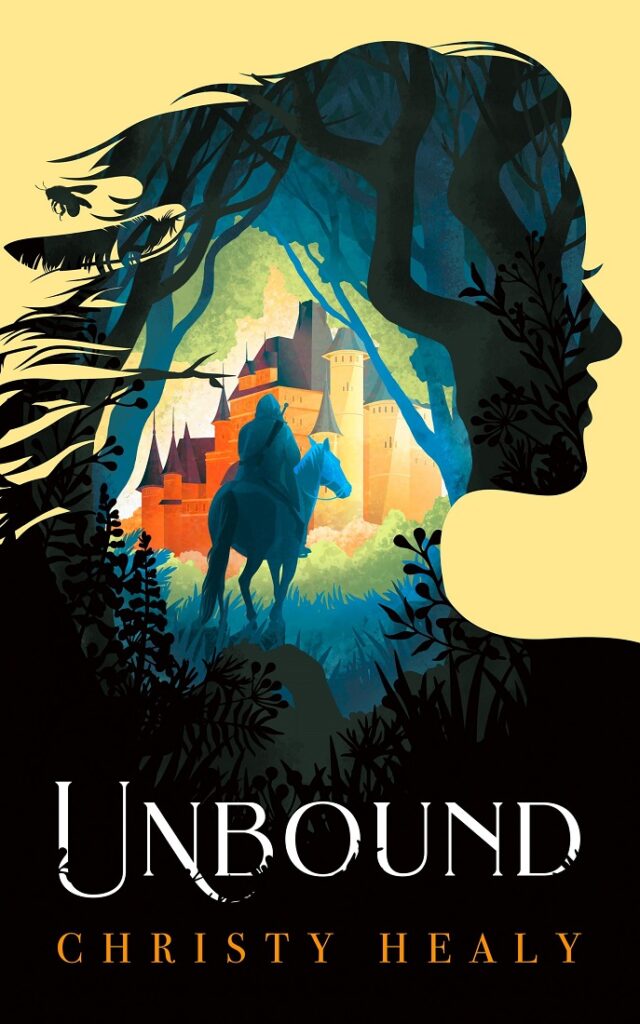
Genres: Fantasy, Historical Fantasy
Published on: 16th January 2024
ISBN: 9798200980611
Goodreads

Unbound is a gender-bent reimagining of the classic tale of a monstrous beast and the beauty determined to tame it, set against the lush backdrop of Irish mythology and folklore.
Rozlyn Ó Conchúir is used to waiting—waiting for the king, her father, to relent and allow her to leave the solitude of her tower; waiting for the dreaded and mysterious Beast of Connacht to at last be defeated; waiting for the arrival of the man destined to win her heart and break the terrible curse placed on her and her land. So when she meets Jamie—a charming and compelling suitor—she allows herself to hope that her days of solitude and patience are over at long last.
But as she finds her trust betrayed—and newer, more sinister threats arising—Rozlyn learns that some curses are better left unbroken …
I received this book for free from the publisher via NetGalley in exchange for an honest review. This does not affect my opinion of the book or the content of my review.
I’ll be blunt: this would have worked much better as a secondary-world setting fantasy than the semi-historical one it tried to be. Each chapter gives us a date in the 11th century, but the characters use modern terminology and slang, and eat potatoes and drink tea, despite those not reaching Ireland til centuries later. The potatoes especially feel mildly offensive, given that ‘potatoe eaters’ is a derogatory term for the Irish that still gets used today (I’m half-Irish and get teased about eating potatoes a fair bit). I’m not properly worked up about it, but it feels like very lazy, hand-wavey writing, like Healy either couldn’t be bothered to do her research or didn’t think her setting would feel Irish enough without potatoes in it.
So I’d have been happier with an Irish-inspired fantasy setting, rather than what we got, is what I’m saying.
On a similar note, I didn’t really care for Healy’s reimagining of the Danaan vs Formorri war from ancient Irish myth. I don’t think it was bad exactly, I just didn’t enjoy it. It all felt very watered-down and simplified, made very black-and-white, and I always find that sort of thing boring and vaguely patronising, as if the reader wouldn’t be able to handle it if it were messily complex.
I adored Rozlyn, though, and her magic, and the extremely messy relationship she has with Jamie; namely, the absolute rage and hatred she feels for him when we first meet these two characters. Powerful, angry women are amazing and I will never get tired of reading about them. But the dual timeline thing Healy was doing – taking us from the present to the past, when a much younger Roz first met Jamie – kind of undercut and distracted from that. I get what Healy was trying to do, and probably plenty of other readers will be happy to see the past timeline, but I was quickly bored with it and found it very unnecessary. We learn what went wrong between Roz and Jamie in the present timeline long before we get to it in the past, which undercut the build up to its reveal; and I just wasn’t sold on their romance, so I had no interest in seeing Roz fall in love. I’d have been much happier sticking to the present, knowing that these two had been in love without having to see it develop. Just skip over that part!
And to be honest, I would have liked Roz to be much more monstrous. I was drawn to Unbound on the promise of a Dark Girl, and Roz isn’t that, really. She’s only angry at, and scary to, people who have deeply wronged her; the rest of the time she’s a do-gooder, and that was disappointing. WHERE ARE MY UNABASHEDLY MONSTROUS MONSTER GIRLS???
Jamie felt so incredibly bland – maybe he’d have read better if we didn’t have beautifully complicated Roz to contrast him with, but as it was he was just…dull. And fairly one-dimensional. And I absolutely despised how the Big Reveal of his past/true identity was literally just dropped on us, told to us – and so early on! – instead of being gradually revealed with mysterious clues given to us along the way. It turned what should have been a huge, Extremely Interesting surprise into a massively underwhelming meh moment. I have no idea why Healy decided to do it the way she did.
Also, don’t pick this up looking for a Beauty and the Beast retelling. It’s not that, at all, and I have no idea why it’s being marketed that way.
According to other early readers, the second half of this book jumps 300 years in the past and is about two other, completely seperate characters. Don’t know what that’s about, since I didn’t get that far, but be braced for that if you decide to read it.

Genres: Fantasy, Contemporary or Urban Fantasy, Queer Protagonists
Representation: Black bisexual MC
Published on: 5th March 2024
ISBN: 1728251974
Goodreads
In a country divided between humans and witchers, Venus Stoneheart hustles as a brewer making illegal love potions to support her family.
Love potions is a dangerous business. Brewing has painful, debilitating side effects, and getting caught means death or a prison sentence. But what Venus is most afraid of is the dark, sentient magic within her.
Then an enemy's iron bullet kills her mother, Venus’s life implodes. Keeping her reckless little sister Janus safe is now her responsibility. When the powerful Grand Witcher, the ruthless head of her coven, offers Venus the chance to punish her mother's killer, she has to pay a steep price for revenge. The cost? Brew poisonous potions to enslave D.C.'s most influential politicians.
As Venus crawls deeper into the corrupt underbelly of her city, the line between magic and power blurs, and it's hard to tell who to trust…Herself included.
I received this book for free from the publisher via NetGalley in exchange for an honest review. This does not affect my opinion of the book or the content of my review.
I have a trigger when it comes to abusive mothers, and that made me need to tap out of this one. I know she won’t be around for long, but the fact that the whole book is driven by seeking justice/revenge for the death of an abusive mother…this isn’t a book I can handle, even though from what I did read, I think Baptiste will probably be good at balancing all the complicated emotions that come when a horrible person you still loved dies.
I really liked what I saw of the worldbuilding – except the Witchers’ allergy to iron, which, I don’t understand how they can live in an urbanised environment at all, then? – even if Baptiste leans heavily into the school of ‘magic should hurt’, which always makes me feel sorry for our magical characters. Characters that I also liked a lot, bar the abusive mother, who is, you know, terrible, but not in a cartoon villain way; in an all-too-believable way, which is too much for me to read but impressive from a craft perspective. The MC’s younger sister, in particular, I already adored at the 10% mark.
I couldn’t read much past that, but I think that if the premise sounds good to you? You should probably pick up Poisons We Drink when you can. Just be mindful of the trigger warnings (which are included at the start of the book, because Baptiste clearly knows what she’s doing and I massively appreciate it!)
Personally, I’d like to try this again sometime when I’m in a better headspace – hopefully by the time pub day for this one comes around!
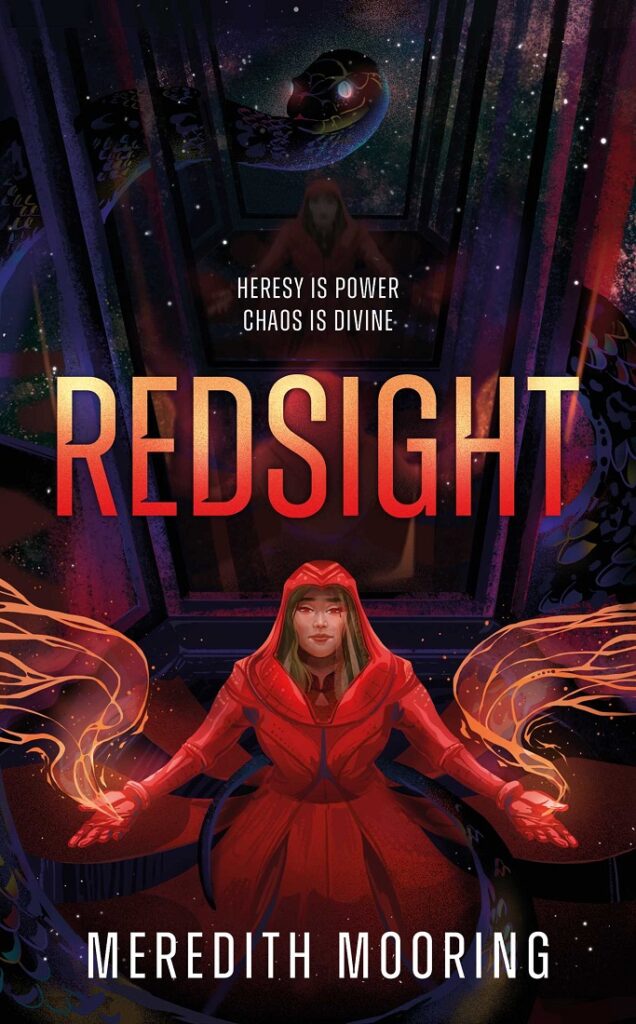
Genres: Queer Protagonists, Science Fantasy
Representation: Sight-impaired sapphic MC, F/F
Published on: 27th February 2024
ISBN: 1786189399
Goodreads

Korinna has simple priorities: stay on the Navitas, stay out of trouble, and stay alive. She may be a Redseer, a blind priestess with the power to manipulate space-time, but she is the weakest in her Order. Useless and outcast. Or so she has been raised to believe.
As she takes her place as a navigator on an Imperium ship, Korinna’s full destiny is revealed to her: blood brimming with magic, she is meant to become a weapon of the Imperium, and pawn for the Order that raised her. But when the ship is attacked by the notorious pirate Aster Haran, Korinna’s world is ripped apart.
Aster has a vendetta against the Imperium, and an all-consuming, dark power that drives her to destroy everything in her path. She understands the world in a way Korinna has never imagined, and Korinna is drawn to her against her better judgment.
With the Imperium and the justice-seeking warrior Sahar hot on her heels, Korinna must choose her side, seize her power and fulfil her destiny--or risk imperiling the future of the galaxy, and destroying the fabric of space-time itself.
I received this book for free from the publisher via NetGalley in exchange for an honest review. This does not affect my opinion of the book or the content of my review.
When I’m ranting about how stupid a book is to the hubby at 2am, it’s time to DNF the book.
I really wanted to love this, okay??? I kept pushing on past the 20% that is my usual cut-off point, trying to give it a chance to get better.
But it just kept getting worse.
I’ve never encountered this problem before, but I don’t think Mooring…understands space??? I don’t mean in the astrophysicist sense or whatever – I don’t need my sci fi that realistic, and for the most part I wouldn’t be able to tell if an author was getting things wrong about space or not ANYWAY. It’s not like I’m an expert. But Redsight is very much about travelling through space – it’s literally the main character’s entire purpose to move ships through space – and from the way this book is written, the way the characters talk about it and the way the worldbuilding is set up, it’s as if everyone things space is flat. There’s a big chunk of Very Scary space called the Umbra (stupidly obvious name, by the way), which is super dangerous to travel through, and I kept waiting for someone to explain why ships can’t just…go around it. Or under it. Or over it. Or teleport past it, since the Redseers/Navigators seem to teleport their ships around space as a matter of course. But nope, that doesn’t seem to be an option.
???
Same problem: what the hell do you mean, there are ‘borderlands’ in space??? Any borders between different polities are going to have to be three dimensional – probably spherical – not just a line drawn on a 2D map. Space, and thus space-travel, goes in all directions! It’s like Mooring can’t visualise that, and is treating her characters’ travels like they’re moving across a 2D map instead of a 3D one.
So that was all very weird and also maddening.
The MC Korinna is ignorant mostly so Mooring has an excuse to infodump the reader through dialogue – seriously, it makes zero sense that a priesthood of space navigators would be kept so ignorant of how space and wider galactic society work – but she’s also just dumb. This is a character who doesn’t think, doesn’t question, is handed a book written by a literal goddess and dismisses it (without even opening it!) as a dry dusty old tome that can’t help her. A book WRITTEN BY A DIVINITY. That goes way beyond ignorance; that’s a complete inability to take in and process information usefully and draw conclusions or even decent guesses from it.
View Spoiler »And I have no time for stupid MCs, even if they are The Most Powerful And Magical Ever. I do not care.
As for the other POV characters…yeah, they’re also naive and one-dimensional and make completely inexplicable decisions.
An attempt was made at intrigue. That is a real and true statement I can make. But is it really intrigue when it’s all either super straightforward or completely irrational???
Two more things: one, Mooring makes the inexplicable decision to have some Really Fucking Important scenes happen off-page, just telling us about them later. In particular, there’s one scene where Korinna has to make a choice where all her options are either horrific or incredibly dangerous for her…and we don’t get to see her make her decision, or the outcome of it. It’s all skipped over, when this is really a defining moment for the character. A life-changing moment. It boggles my mind that Mooring decided to skip it.
And finally, although the idea of the magic, particularly the Redseer/Navigator magic, was very cool, I really didn’t understand how it worked, or what Korinna was doing whenever she used it. I hate ‘hard’ magic systems, I don’t want my magic to be like Maths, I am very happy for it to be strange and mystical. But I still need to know what to picture when magic is happening. I still need to know what the character is doing when she uses her magic. And I had absolutely no clue, at any point. Which doesn’t make your magic feel magical, it just makes it confusing and wishy-washy and hand-wavey. No thank you.
Ultimately, though the premise is very awesome, and the prose is reasonably solid (although I highlighted quite a few paragraphs or bits of imagery that made very little sense…) Redsight reads like it needs a couple more major rewrites before it lives up to its potential. The bone structure of something genuinely epic is in here, but the characters need major work, the worldbuilding could be designed and conveyed much better than it currently is, and the magic could definitely use some fleshing out. As-is, it’s a disappointment.

Genres: Fantasy, Horror, Queer Protagonists
Representation: Sapphic MC, trans MC, F/F
Published on: 20th September 2022
ISBN: 1957957115
Goodreads

IN THE BEGINNING, MAN WAS PREY.
WITHOUT THE GODS, THEY'LL BE PREY AGAIN.
The old gods have fled, and the monsters they had kept at bay for centuries now threaten to drown the city of Valentine, hunting mankind as in ancient times. In the midst of the chaos, a serial killer has begun ritually sacrificing victims, their bodies strewn throughout the city.
Lilac Antonis wants to stop the impending destruction of her city by summoning her mother, a blood god—even if she has to slit a few throats to do it. But evading her lover Arcadia and her friends means sneaking, lying, and even spilling the blood of people she loves.
Alex and Cecil of Ace Investigations have been tasked with hunting down the killer, but as they close in—not knowing they're hunting their close friend Lilac—the detectives realize the gods may not have left willingly.
As flooding drags this city of cars and neon screaming into the jaws of sea demons and Arcadia struggles to save the people as captain of the evacuation team, Lilac’s ritual killings at last bear fruit, only to reveal her as a small piece in a larger plan. The gods’ protection costs far more than anyone has ever known, and Alex and Cecil are running out of time to discover the true culprit behind the gods’ disappearance before an ancient divine murder plot destroys them all.
Set in an alternate reality which updates mythology to near-modern day, NO GODS FOR DROWNING is part hunt for a serial killer, part noir detective story, and unlike anything you’ve ever read before.
I don’t think this is a bad book, but it’s one I have to admit to myself that I’ve lost interest in. Probably reading it all at once would have made for a better reading experience, but I kept getting distracted by other books, and every time I came back to Drowning, it was more and more reluctantly. I just…wasn’t interested; none of the cast drew me in, and the world Piper’s created here is both grim and not that interesting (at least not to me). I made it past the 60% mark, and I still feel absolutely no urge to see how it all ends.
When reading it feels like a chore, you need to stop reading. And I just don’t want to pick this up again.
But I do think a major part of that is a matter of taste; I can see readers who enjoy their SFF darker (and grimmer; not always the same thing) than I do having a good time with it. But alas, it is not for I, and I probably won’t be coming back to it.
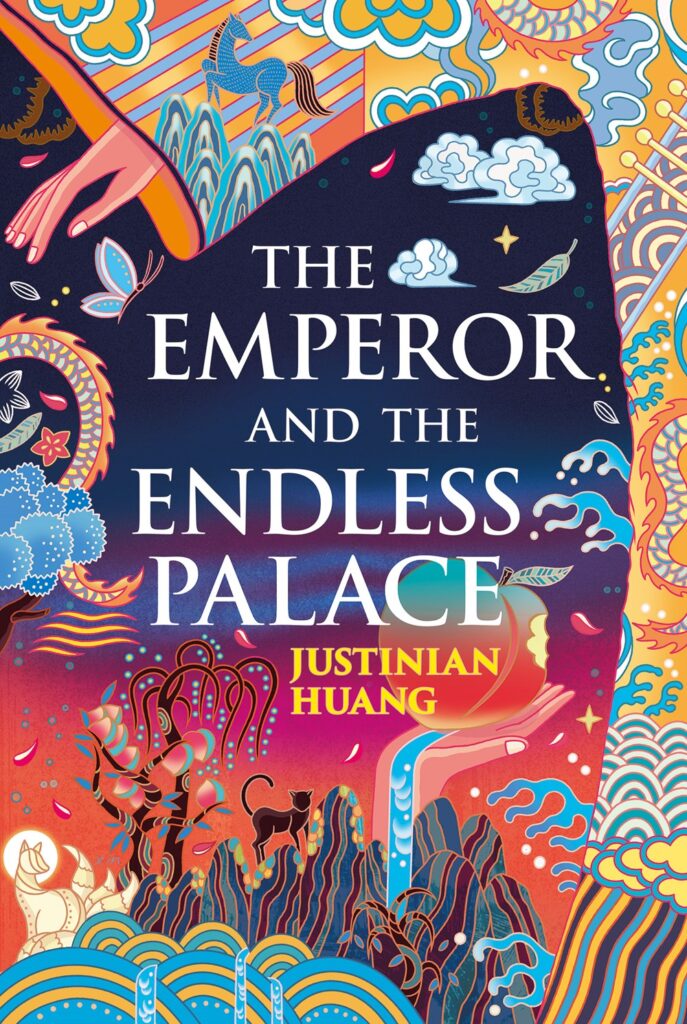
Genres: Queer Protagonists, Speculative Fiction
Representation: Chinese MCs, M/M
Published on: 26th March 2024
Goodreads

“What if I told you that the feeling we call love is actually the feeling of metaphysical recognition, when your soul remembers someone from a previous life?”
In the year 4 BCE, an ambitious courtier is called upon to seduce the young emperor — but quickly discovers they are both ruled by blood, sex and intrigue.
In 1740, a lonely innkeeper agrees to help a mysterious visitor procure a rare medicine, only to unleash an otherworldly terror instead.
And in present-day Los Angeles, a college student meets a beautiful stranger and cannot shake the feeling they’ve met before.
Across these seemingly unrelated timelines woven together only by the twists and turns of fate, two men are reborn, lifetime after lifetime. Within the treacherous walls of an ancient palace and the boundless forests of the Asian wilderness to the heart-pounding cement floors of underground rave scenes, our lovers are inexplicably drawn to each other, constantly tested by the worlds around them.
As their many lives intertwine, they begin to realize the power of their undying love—a power that transcends time itself…but one that might consume them both.
An unpredictable roller coaster of a debut novel, The Emperor and the Endless Palace is a genre-bending romantic thriller that challenges everything we think we know about true love.
I received this book for free from the publisher via NetGalley in exchange for an honest review. This does not affect my opinion of the book or the content of my review.
A note: the sharp-eyed among you might notice that I didn’t list The Emperor and the Endless Palace as a received arc in my December roundup. That’s because the PDF I received via Netgalley has font so tiny I really can’t read it on my Kindle – and with my hands being as messed up as they are, I can’t hold something like a tablet, or anything else that can deal with a PDF file, long enough to read a novel on it. If I can’t read it on my Kindle, I can’t read it.
But I was so excited for this book, I tried to read it anyway. Thus, this review. And a headache, from so much squinting.
Not gonna lie: this is particularly heartbreaking. I was so looking forward to this book! It was one of my most anticipated of the year! But it turns out this one is definitely not for me. I’m not sure if it’s objectively bad, but it’s not the kind of book I want to read – it’s written in a very Literary Fiction style, and the prose is…fine? But I was hoping for lush gorgeousness, and this isn’t that. Nor did any of the narrators (who are probably all the same soul reincarnated in different time periods) grip me – I didn’t care about their stories, their goals. They all seemed like such…small, banal or petty people. No one I wanted to read about.
I’m shallow as hell; I like my fantasy pretty, and a) I’m not sure this qualifies as strict fantasy at all, and b) the characters are all tangled up in messes that felt cynical and/or sad and/or pointless. I don’t care about the gay club scene; all the backstabbing and viciousness of the imperial Chinese court just made me feel horrified and sad; the inn plotline was the one that most interested me, but that’s not saying much. I found no beauty here, and no richness.
I wanted more magic; I didn’t enjoy the writing style, which is always a dealbreaker for picky little me; and I’m just…too raw for something this gritty and…realistic, I guess? I was expecting something softer, more beautiful, more magical; instead Huang has written something very honest and upfront about… I won’t say ‘the human condition’. But The Emperor and the Endless Palace felt bleak to me. That’s it, that’s the word I want: it’s bleak, and also boring, and the prose is fine but it’s not decadent and descriptive the way I was hoping it would be. There’s just nothing for me to latch on to here.
I mean, I found it so dull that by 25% of the way through, I was having a hard time keeping myself awake, despite all the ScandalousTM stuff that was happening (and had already happened) and all the Obviously Important plotlines that were just getting started. I had no interest in seeing where any of them went. Not the romance with the Emperor; not even the revelation of the maybe-fox spirit!
Maybe it gets much more Romantasy as it goes on; maybe if I’d kept pushing through, I’d have found the magic. But my tbr is way too long to keep reading something I’m not enjoying, in the hopes that it might get better. I feel guilty for not enjoying it – can you tell? – but that’s not enough to keep me reading, either.
Sad!Sia is sad about this one, folx. Really-really.

Genres: Fantasy, Queer Protagonists
Representation: Black MCs, Black sapphic MC
ISBN: 0593723015
Goodreads

DIVIDED BY BLOOD.
IMPRISONED BY FATE.
BOUND BY DESIRE.
WELCOME TO THE INTOXICATING WORLD OF THE FAE.Yeeran is a warrior in the elven army and has known nothing but violence her whole life. Her sister, Lettle, is trying to make a living as a diviner, seeking prophecies of a better future.
When a fatal mistake leads to Yeeran’s exile from the Elven lands, they are both forced into the terrifying wilderness beyond their borders. There they encounter the impossible: the fae court.
The fae haven’t been seen for a millennium. But now Yeeran and Lettle are thrust into their seductive world – torn between their loyalty to each other, their elven homeland, and their hearts. . .
I hate this so incredibly much that I’m kind of wondering if everyone who enjoyed it is okay. Or if there’s something wrong with my copy and I didn’t read the same book everyone else did. The Final Strife was a book I didn’t finish because I didn’t get along with the writing, but I didn’t think it was bad, just not a good fit for me. Nothing personal, we part as friends, etc.
This is bad.
Salawa’s breathing elongated as she fell into a deep slumber.
I’m sorry, her breathing WHAT?!
The opening pages are quite beautiful, but terrible phrasing, poor writing rhythm, and abysmal worldbuilding start making themselves known almost immediately. The so-called Endless War is being fought on a single battlefield (what kind of war has just one battlefield???) which lies above rich mines of the all-important fraedia crystal. (If no one’s mined them because the land above them is a battlefield, how does anyone even know they’re there???)
Now: these crystals are so valuable because they emit light and heat, and can be used for growing plants instead of sunlight. We’re beaten over the head with how these crystals are desperately needed to combat the poverty and starvation afflicting the Elven Lands. But…this makes no fucking sense. In an icy or underground world, sure, you’d need crystals like these. Or a world with no sun. But none of that applies here! In which case, hi, why do we care about these crystals? They won’t help with starvation; for that you need food. Is there a famine? Is there no more land available for agriculture? Has some kind of blight struck your crops? How will glowy crystals help people??? No fucking clue.
One crystal would be sufficient for a household to grow their own food and warm their homes for a year, maybe more.
Why can’t they grow their own food with just sunlight? YOU NEED TO EXPLAIN THIS.
Given that the elves are Black and they ride camels (someone needs to tell this author that camels don’t have hooves, by the way) I thought we were in some kind of desert-inspired setting. But only after Yeeran’s exile do we learn that we’re in a rainforest??? Why are we only learning that this late??? Still, a rainforest setting would be great – rainforests aren’t just beautiful, they’re also something I don’t see often in fantasy and was excited to get. Except that the environment is never described – the characters never have to deal with humidity, insects are barely mentioned, we have no idea what the local flora and fauna are like. I had no idea what to picture.
Pretty much everything is like this – undescribed, and therefore bland. There are four elven tribes, but nothing distinguishes them from each other, and honestly other than being accepting of nonbinary folx and having mostly turned away from divination and/or religion, I know nothing about any elven culture. They don’t seem to have one. What do they eat? Wear? What kinds of industry or crafts do they have? What are their views on sex, family, the afterlife? We know they have gold and silver coins; what’s their currency called? No idea. Nothing. What distinguishes them from the humans or fae? As far as I can tell, nothing except that humans have round ears and fae have wings.
The younger sister, Lettle (seriously, you named the little sister ‘little’?) is at least aware that the war is fucked up and the elven leaders are just using it to get rich, but Yeeran’s naïveté just blew my mind. Not to mention, for someone just raised to Colonel, she is, militarily speaking, a fucking idiot. I wanted to scream at how stupid she was! Who the hell put her in charge on a battlefield, and why did they do it? Once she’s exiled, she becomes obsessed with hunting down a magical animal to buy her way back home, out of her exile – even though the only time anyone has bought their way back from exile was with a huge amount of fraedia crystals, not magic animal skins, so why does she think this will work?
Then the cringey dialogue with the insta-lust. CAN WE JUST NOT, FOR THE LOVE OF THE GODS.
‘Don’t burn it this time.’
He didn’t contradict her that he hadn’t burned any of the meals thus far.
Ah, yes. Because Strong WomenTM get so unreasonable when they get hit with feels. Except this isn’t even slightly feels, it’s just plain ‘ol lust. WHICH WOULD HAVE BEEN FINE IF IT HAD BEEN ACKNOWLEDGED. Just call it lust! Let your characters be attracted to each other and have fun without calling it a romance. There’s nothing wrong with that! But calling it love~ when your characters are just obsessing over the other person’s body parts – ARGH.
‘These extras are in case you need them later, but don’t take too many. It can be lethal.’
YOU DIDN’T TELL HIM HOW MANY ARE TOO MANY.
More than anything, it was the bad writing that just killed me. Horrifically awkward phrasing, too much assuming that synonyms are interchangeable (‘grin’ and ‘smile’ are synonyms, but if you mean one then the other is WRONG), and hi, you are writing way too many poems/songs without, apparently, any awareness that rhymes in particular need a set pattern of syllables. IF YOU BREAK THE PATTERN YOUR STUPID RHYME IS LIKE A FORK ON A BLACKBOARD, HOW CAN YOU NOT HEAR IT YOURSELF??? The creation myth that acted like a prologue was lovely; the tales of the last human we get later are atrociously bad. I don’t know what the hell was going on here.
The camel sprang quickly to standing
Who writes like this? Or here, when Yeeran’s reflecting on how she doesn’t want to retire from the military, it’s phrased thusly;
Yeeran couldn’t imagine not wanting to stop combat.
That’s just incorrect. That’s not a proper sentence. That’s not how anyone would ever phrase that. Where was the editor? Did the editor just assume that because El-Arifi’s previous trilogy did well there was no need to edit her new one??? Because honestly, that’s the only way this makes any sense to me.
This next part isn’t bad writing, I just think it’s horrible: the divination and battle-magic of the elves come from slaughtering magical creatures called obeah, and thanks, I hate this. These creatures get more intelligent the older they get, but their magic also gets stronger, so their skins and fur etc are more valuable then. So, just to be clear, you’re murdering intelligent beings. We have a scene where Lettle kills and cuts open an obeah cub for prophecy – a prophecy which does not answer her question and is just needlessly mysterious, which I feel makes the cub’s death even more tragic. And you want me to like this character? No. It’s wrong, and it’s disgusting, and I suspect at some point the sisters are going to discover the obeah are actually sapients and it will be a Big Deal but I still hate everything about this.
I saw another reviewer write ‘So, did you like A Court of Thorns and Roses but thought Feyre was too smart? Did you like Fourth Wing but found the politics too complicated? Never fear, Faebound is here!’
And you know what??? That sums it up pretty perfectly.
Please consider Faebound defenestrated from my home. With prejudice.

Genres: Fantasy, Historical Fantasy, Queer Protagonists
Representation: F/F, minor M/M
Published on: 14th May 2024
ISBN: B0CFKZFYC1
Goodreads

The Honey Witch of Innisfree can never find true love. That is her curse to bear. But when a skeptic who doesn’t believe in magic arrives on her island, sparks fly in this deliciously sweet debut novel of magic, hope, and love overcoming all.
Twenty-one-year-old Marigold Claude has always preferred the company of the spirits of the meadow to any of the suitors who’ve tried to woo her. So, when her grandmother whisks her away to her cottage on the tiny Isle of Innisfree with an offer to train her as the next Honey Witch, she accepts immediately. But her newfound magic and independence comes with a no one can fall in love with the Honey Witch.
When Lottie Burke, a notoriously grumpy skeptic who doesn’t believe in magic, shows up on her doorstep, Marigold can’t resist the challenge to prove to her that magic is real. But soon, Marigold begins to care for Lottie in ways she never expected. And, when darker magic awakens and threatens to destroy her home, she must fight for much more than her new home—at the risk of losing her magic and her heart.
I received this book for free from the publisher via NetGalley in exchange for an honest review. This does not affect my opinion of the book or the content of my review.
The Honey Witch is…aggressively fine. But it rubbed me the wrong way almost from the start; the story almost falls over itself it moves so fast, rushing as if trying to get itself over with. A story about honey-magic makes me expect lush, soft prose, and languorous pacing, but that is absolutely not what we have here; seriously, what is the damn rush? The dialogue is stilted and false, with random shifts in topic and passionate reactions that come out of nowhere and seem massively disproportionate. And rather than letting us slowly and deliciously discover this world bit by bit, Shields beats us about the head with clunky info-dumping.
There are moments of brilliance – especially in the opening chapters, Shields occasionally gives us a line that really sparkles;
what is so wrong about being a bitch? It is the closest a girl can be to a wolf.
But these are few and far between. There’s quite a bit of preaching, most of it shoehorned in where there really isn’t room for it; for example, early on there’s a passage where, out of nowhere, Marigold starts thinking about ‘the world’s penchant for beautiful, dead girls’. Cue a rambly aside on how society prefers girls die young and pretty rather than grow old and…become witches? Like, this is a genuine issue (well, maybe not the witchy part, in this day and age) but the lecture is coming completely out of left field; nothing in the chapter up to this point had anything to do with this topic. It’s not a tough subject being examined by the narrative; it’s Shields grandstanding, and not being even the tiniest bit subtle about it.
Then there’s the worldbuilding, which, hoo boy. So the whole honey-witches-can’t-fall-in-love thing???
She cursed us to never have anyone fall in love with us in an attempt to end us.
The curse isn’t a punishment, or intended to inflict suffering – the goal was to end the bloodline of honey witches. What??? Uh, does someone need to explain to Shields that love isn’t a required part of the recipe for having a child??? How in the gods’ names does cursing you to never have true love equal a family dying out???
Except no, Shields is well aware; not only did Marigold’s grandmother have a child without love, she had a child without a partner at all. She literally made a baby with magic, all by herself.
HI. IF THAT’S A THING WITCHES CAN DO…WHAT THE FUCK IS WITH THE DAMN CURSE???
It annoys the hell out of me both because it’s just stupid, and because it would have cost Shields nothing to change the motivation of the witch who cast the curse. Say she wanted this family to suffer! Say she did it out of vengeance or sadism or anger or whatever. But if her goal was to end her enemy’s bloodline, the curse is completely pointless.
Does Shields require the curse for plot? Yes. So keep the curse, but come up with some kind of reasonable backstory for it, for crying out loud. It’s not hard.
Then there’s the whole nonsense about how, just like water is the opposite of fire, and air the opposite of earth…honey is the opposite of ashes.
No.
Sorry, but. No.
Again: completely and utterly unnecessary. All you had to say was, these are the two kinds of magic, honey magic and ash magic. Ta da! You didn’t need to set them up as some kind of elemental opposites. Because now you just sound confusing and stupid.
Why is this like this???
And I don’t even want to talk about how the whole ‘Marigold, you’re a witch’ thing went down, with her mother screaming at her grandmother and being The Most Dramatic and I could not stop cringing at all of it.
The Honey Witch just…really isn’t what it’s being marketed as. I think the blurb makes it sound the Marigold is already in Innisfree when the story begins, and there’s nothing to make you think it’s not set in the present day. But both those presumptions are completely incorrect!
The book starts with Marigold – in a Regency-esque time period – not having fun at a ball, which, fair. But the whole first 20% is just this…not-that-subtly anti-men, anti-marriage spiel, which, somewhat fair, but Shields really shoves it down your throat. Marigold is The Most Special because she goes and dances in the rain and meets up with magic butterflies rather than looking for a husband, and all of this with the fast-forward button on, and the info-dumping, and dialogue like…like I don’t even know what. Like a badly written script being performed by very bad actors. And not just info-dumping, but telling-telling-telling, recounting the past for us at light-speed so we know how all the relationships work, because we certainly don’t get a chance to get a feel for those relationships ourselves. There’s no emotional development at all, and then the grandmother whisks Marigold away to start her new life as a witch.
I was expecting – and wanted – languid storytelling, cosy and sweet, with pretty prose and a grumpy/sunshine romance. Instead, I got choppy writing, an origin story we didn’t need (seriously, it would have saved so much cringing if the story had opened with Marigold on Innisfree instead of the headless chicken that was the glimpse of her home life), insultingly stupid worldbuilding, and a book that just can’t figure out how to slow down. Did someone hand Shields back her manuscript and tell her she had to cut 300 pages or something? Because that’s almost what it feels like, a story crammed into fewer pages than it needs.
Reading The Honey Witch was like wearing the worst scratchy wool you can think of; it just itched, and it’s such a relief to call it quits and not have to deal with it any more. THANK YOU BUT NO.
Crossing my fingers and toes for a better reading month in February!

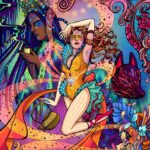



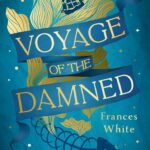
I’m sorry to hear the year is off to such a disappointing start (I too DNFed Redsight – it sounds like you stuck it out longer than I did, and I’m selfishly glad I didn’t persevere as I was reacting against the same issues and oh my it sounds like they just got worse and worse).
In fairness, I also read a bunch of awesome things – there were just a lot of DNFs too! (And I’m relieved to know it’s not just me, re Redsight. You definitely made the right call. I don’t understand the hype!!!)
That was a lot of unloading. Although I’m still want to read the books mentioned on this list, I heard similar complaints about 2 of them. Sometimes, we need to heed the warnings. You’ll find out my feelings about these books soon enough.
I’ll keep an eye out for your reviews!
Oh no, I’ve been seeing FATHOMFOLK get mixed reviews. If the prose and phrasing aren’t quality, I can see myself also DNFing it quickly.
I strongly recommend grabbing it from the library if you’re curious…or at least using the Big River site’s ‘read a sample’ function first before you buy a copy!